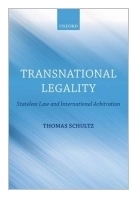|
||
• wydawnictwa polskie
• Zamów informacje o nowościach z wybranego tematu • kontakt
• Cookies na stronie |
TRANSNATIONAL LEGALITYSCHULTZ TH.wydawnictwo: OXFORD UNIVERSITY , rok wydania 2014, wydanie Icena netto: Transnational LegalityWhat should we call law when it is not the law of one or several states? Does it actually matter what we call law? How can we take into account the consequences of calling something law when we shape the concept of law in the first place? How does international arbitration help to illustrate the problem? This book is an investigation into stateless law, illustrated by international arbitration regimes. It addresses key philosophical questions posed by international arbitration as a potential path to law beyond the state. It ascertains which dimensions of transnational legality arbitral regimes conform to, and what consequences follow from it. The argument of this book is firmly rooted in contemporary legal positivism and is attentive to current debates regarding the rule of law to ponder legality without territory. A theory is suggested regarding the minimal conditions that transnational regimes must fulfil in order to legitimately and appropriately count as law. The theory is tested on various arbitral regimes. The book thus offers reflections on the extent to which legality and the rule of law can serve as a moral and political benchmark for transnational regimes, to assess the political morality of arbitration's current autonomy from states and what arbitration's claim for an increase in that autonomy implies. Introduction ; Prelude ; 1. The Importance of Law ; 2. The Minimal Conditions of Non-State Law ; 3. Arbitration Regimes as Legal Systems ; Conclusion 224 pages, Hardcover Księgarnia nie działa. Nie odpowiadamy na pytania i nie realizujemy zamówien. Do odwolania !. |


